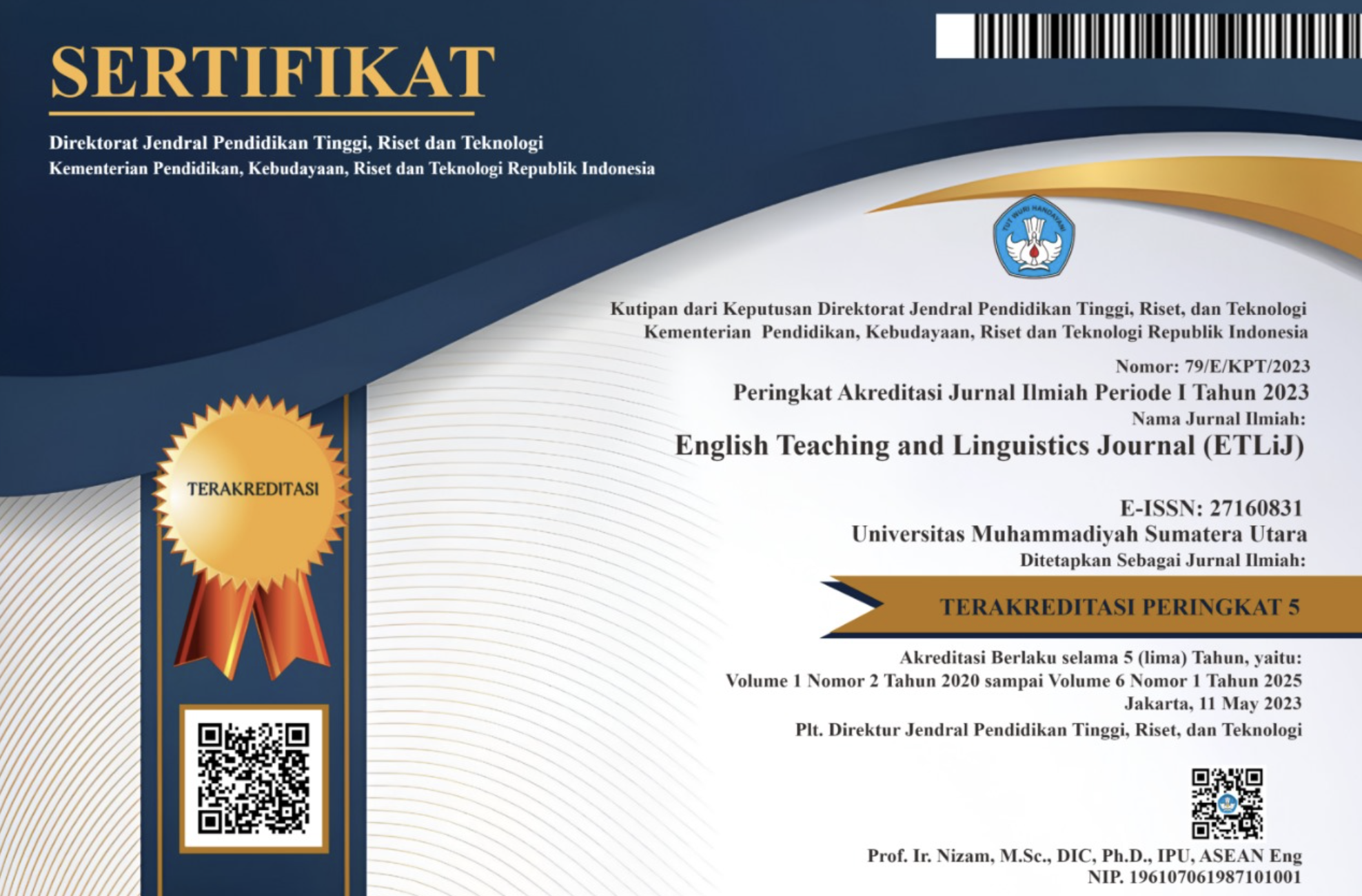The Impact of Students' Impressions of the School Environment andSelf-Discipline Towards the Learning Outcomes for English
Abstract
Keywords
Full Text:
PDFReferences
Ajmain, A., & Marzuki, M. (2019). Peran guru dan kepala sekolah dalam pendidikan karakter siswa di SMA Negeri 3 Yogyakarta. SOCIA: Jurnal Ilmu-Ilmu Sosial, 16(1), 109–123.
Anggraini, Y., Patmanthara, S., & Purnomo, P. (2017). Pengaruh Lingkungan Belajar Dan Disiplin Belajar Terhadap Hasil Belajar Kompetensi Keahlian Elektronika Industri Di Sekolah Menengah Kejuruan. Jurnal Pendidikan: Teori, Penelitian, Dan Pengembangan, 2(12), 1650–1655.
Arifin, M. F. (2018). Model kerjasama Tripusat Pendidikan dalam Pendidikan Karakter Siswa. Muallimuna: Jurnal Madrasah Ibtidaiyah, 3(1), 78–86.
Chaerunisa, Z., & Latief, J. (2021). Pengaruh Disiplin Belajar Terhadap Prestasi Belajar IPS di Sekolah Dasar. Edukatif: Jurnal Ilmu Pendidikan, 3(5), 2952–2960.
Fauzil‘Adzim, M. (2021). Sinergitas Tri Pusat Pendidikan dalam Penguatan Nilai-Nilai Pendidikan Karakter Peseta Didik. An-Nuha: Jurnal Kajian Islam, Pendidikan, Budaya Dan Sosial, 8(1), 79–96.
Ginting, P., Hasnah, Y., Saragih, M., & Kharisma, A. (2024). The Embodiment of Environmental Discourse in Language Learning: A Critical Ecolinguistic Study of EFL Textbooks in Indonesia. Language Related Research, 15(1), 145-175.
H. Rifa’i Abubakar. (2021). Pengantar Metodologi Penelitian. SUKA-Press UIN Sunan Kalijaga.
Handayani, E. S., & Subakti, H. (2021). Pengaruh disiplin belajar terhadap hasil belajar Bahasa Indonesia di Sekolah Dasar. Jurnal Basicedu, 5(1), 151–164.
Jannah, L. M., & Prasetyo, B. (2011). Pendekatan Kuantitatif. Materi Pokok Metode Penelitian Kuantitatif, 1–19.
Jaya, T. P., & Suharso, S. (2018). Persepsi Siswa Tentang Faktor yang Mempengaruhi Disiplin Belajar Pada Siswa Kelas XI. Indonesian Journal of Guidance and Counseling: Theory and Application, 7(3), 30–35.
Khadijah. (2016). Belajar dan Pembelajaran (2nd ed.). Citapustaka Media.
Khoiruddin, M. (2018). Pendidikan Islam tradisional dan modern. TASYRI’: JURNAL TARBIYAH-SYARI’AH ISLAMIYAH, 25(2), 92–105.
Kusnarti, G., & Supeno, S. (2019). Pengaruh persepsi siswa atas lingkungan sekolah dan disiplin belajar terhadap prestasi belajar bahasa Inggris. Inference: Journal of English Language Teaching, 2(1), 54–59.
Linda Darling, Hammond, Channa M. Cook, & Harvey. (2018). Educating the Whole Child: Improving School Climate to Support Student Success. Learning Policy Institute.
Mulyana, R. (2009). Penanaman etika lingkungan melalui sekolah perduli dan berbudaya lingkungan. Jurnal Tabularasa, 6(2), 175–180.
Musianto, L. S. (2002). Perbedaan pendekatan kuantitatif dengan pendekatan kualitatif dalam metode penelitian. Jurnal Manajemen Dan Kewirausahaan, 4(2), 123–136.
Nasution, D. K., & Kharisma, A. J. (2024). LEARNING TRANSLATION METHODS: STUDY ANALYSIS OF TOURISM BROCHURE" INSPIRATION OF HISTORICAL HERITAGE". Jurnal As-Salam, 8(1), 16-33.
Nawafil, M., & Junaidi, J. (2020). Revitalisasi paradigma baru dunia pembelajaran yang membebaskan. Jurnal Pendidikan Islam Indonesia, 4(2), 215–225.
Priyatno, D. (2008). Mandiri belajar SPSS: untuk analisis data dan uji statistik.
Rahmadi. (2011). Pengantar Metodologi Penelitian (Syahrani, Ed.). Antasari Press.
Ramdhan, M. (2021). Metode penelitian. Cipta Media Nusantara.
Senjaya, P., Kotamena, F., Ong, F., Andika, C. B., Purwanto, A., & Pramono, R. (2020). School environmental influences, student discipline and learning motivation toward increasing senior high students achievement. International Journal of Advanced Science and Technology, 29(05), 4572–4586.
Sirikulchayanonta, C., Ratanopas, W., Temcharoen, P., & Srisorrachatr, S. (2011). Self discipline and obesity in Bangkok school children. BMC Public Health, 11, 1–8.
Sulaiman Saat, & Sitti Mania. (2020). Pengantar Metodologi Penelitian (Mudzakkir, Ed.; 2nd ed.). Pustaka Almaida.
Syafrida Hafni Sahir. (2021). Metodologi Penelitian (1st ed., Vol. 1). KBM Indonesia.
Wati, A. K., & Muhsin, M. (2019). Pengaruh Minat Belajar, Motivasi Belajar, Lingkungan Keluarga, dan Lingkungan Sekolah Terhadap Kesulitan Belajar. Economic Education Analysis Journal, 8(2), 797–813.
DOI: https://doi.org/10.30596/etlij.v5i1.17559
Refbacks
- There are currently no refbacks.

This work is licensed under a Creative Commons Attribution 3.0 License
ISSN: 2716-0831





